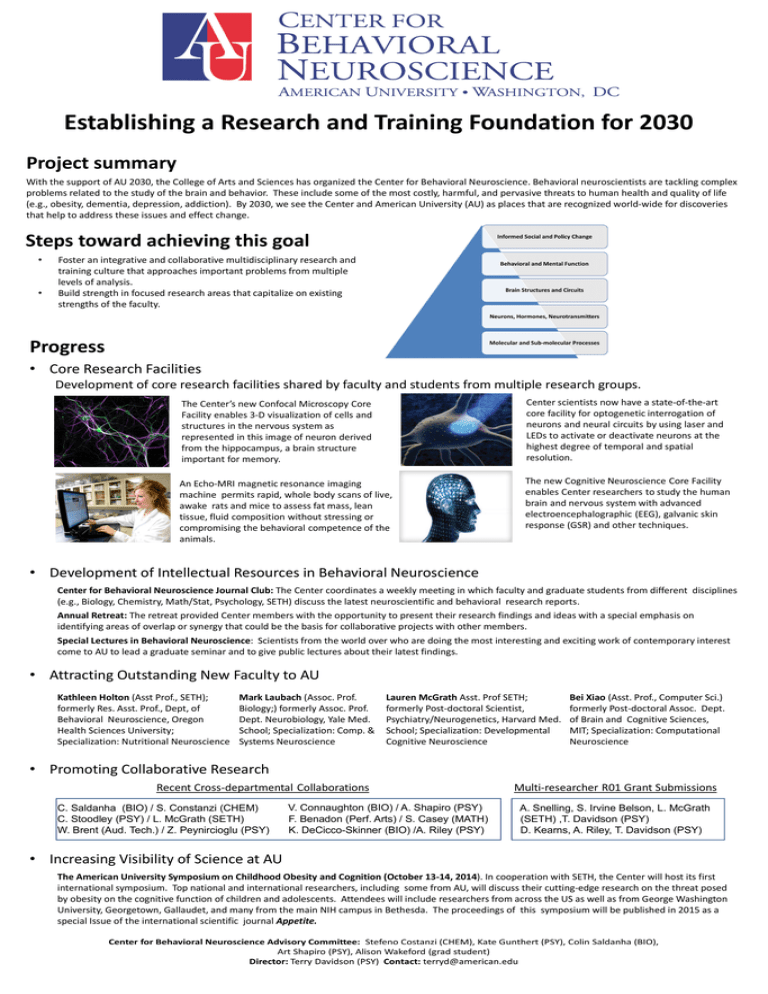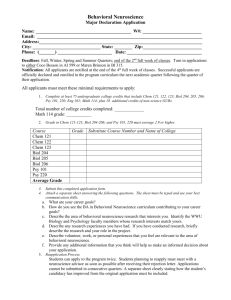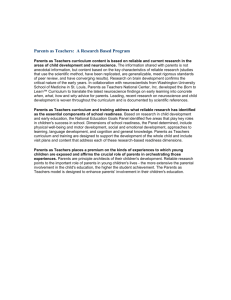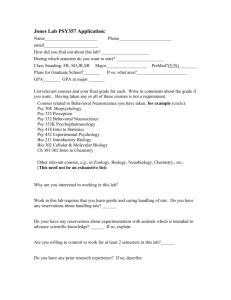Establishing a Research and Training Foundation for 2030 Project summary
advertisement

Establishing a Research and Training Foundation for 2030 Project summary With the support of AU 2030, the College of Arts and Sciences has organized the Center for Behavioral Neuroscience. Behavioral neuroscientists are tackling complex problems related to the study of the brain and behavior. These include some of the most costly, harmful, and pervasive threats to human health and quality of life (e.g., obesity, dementia, depression, addiction). By 2030, we see the Center and American University (AU) as places that are recognized world-wide for discoveries that help to address these issues and effect change. Steps toward achieving this goal • • Foster an integrative and collaborative multidisciplinary research and training culture that approaches important problems from multiple levels of analysis. Build strength in focused research areas that capitalize on existing strengths of the faculty. Progress • Core Research Facilities Development of core research facilities shared by faculty and students from multiple research groups. • Development of Intellectual Resources in Behavioral Neuroscience Center for Behavioral Neuroscience Journal Club: The Center coordinates a weekly meeting in which faculty and graduate students from different disciplines (e.g., Biology, Chemistry, Math/Stat, Psychology, SETH) discuss the latest neuroscientific and behavioral research reports. Annual Retreat: The retreat provided Center members with the opportunity to present their research findings and ideas with a special emphasis on identifying areas of overlap or synergy that could be the basis for collaborative projects with other members. Special Lectures in Behavioral Neuroscience: Scientists from the world over who are doing the most interesting and exciting work of contemporary interest come to AU to lead a graduate seminar and to give public lectures about their latest findings. • Attracting Outstanding New Faculty to AU Kathleen Holton (Asst Prof., SETH); formerly Res. Asst. Prof., Dept, of Behavioral Neuroscience, Oregon Health Sciences University; Specialization: Nutritional Neuroscience Mark Laubach (Assoc. Prof. Biology;) formerly Assoc. Prof. Dept. Neurobiology, Yale Med. School; Specialization: Comp. & Systems Neuroscience Lauren McGrath Asst. Prof SETH; formerly Post-doctoral Scientist, Psychiatry/Neurogenetics, Harvard Med. School; Specialization: Developmental Cognitive Neuroscience Bei Xiao (Asst. Prof., Computer Sci.) formerly Post-doctoral Assoc. Dept. of Brain and Cognitive Sciences, MIT; Specialization: Computational Neuroscience • Promoting Collaborative Research C. Saldanha (BIO) / S. Constanzi (CHEM) C. Stoodley (PSY) / L. McGrath (SETH) W. Brent (Aud. Tech.) / Z. Peynircioglu (PSY) V. Connaughton (BIO) / A. Shapiro (PSY) F. Benadon (Perf. Arts) / S. Casey (MATH) K. DeCicco-Skinner (BIO) /A. Riley (PSY) A. Snelling, S. Irvine Belson, L. McGrath (SETH) ,T. Davidson (PSY) D. Kearns, A. Riley, T. Davidson (PSY) • Increasing Visibility of Science at AU The American University Symposium on Childhood Obesity and Cognition (October 13-14, 2014). In cooperation with SETH, the Center will host its first international symposium. Top national and international researchers, including some from AU, will discuss their cutting-edge research on the threat posed by obesity on the cognitive function of children and adolescents. Attendees will include researchers from across the US as well as from George Washington University, Georgetown, Gallaudet, and many from the main NIH campus in Bethesda. The proceedings of this symposium will be published in 2015 as a special Issue of the international scientific journal Appetite.



